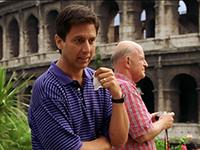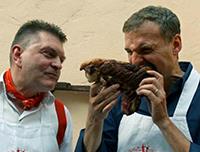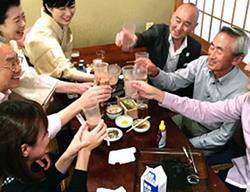Everybody Loves Raymond co-creator Phil Rosenthal’s new TV series isn’t a sitcom – it’s a travel and food show. But it’s funnier than most sitcoms, and just might contain the secret to world peace…
I’ll Have What Phil’s Having is a six-part series premiering on PBS Monday, Sept. 28, at 10 p.m. ET (check local listings, because New York and some other markets are showing it at 8 or other times). On the one hand, similar in concept to the travel shows of Michael Palin or the traveling food shows of Anthony Bourdain, Guy Fieri, Rick Sebak and others. Go to interesting places, eat interesting food, react, and repeat as necessary.
But on the other hand, Rosenthal, with his gregarious and down-home personality and true passion for people as well as meals, is on to something quite different here. Different, and, like the food he samples and shares, delicious.
Rosenthal and I met up in New York last Wednesday to talk about his new series. (Bad planning on my part: He was fasting because of Yom Kippur, so we didn’t eat.) I asked where he got the idea for a nonfiction, unscripted travel show about food – and, more to the point, thought he was the one to do it, and talked PBS into believing in him.
Turns out it comes from an episode of Everybody Loves Raymond: The two-part Season 5 opener, in 2000, in which Raymond (Ray Romano) and his family travel to Italy. Raymond hates the idea at first, but eventually, because of the people and the scenery and the food, comes to love the place.
“At the end of Season 1 of Everybody Loves Raymond,” Rosenthal told me, “I ask Ray Romano, “‘Where you going on hiatus?’ He goes, ‘Jersey shore.’ I said, ‘Well, how about Europe?’ He goes, ‘Ehhh.’ I said, ‘Why not?’ He goes, ‘I’m not really interested in other cultures.’ Even his own culture, Italy. ‘How about going to Italy?! You know it’s fantastic there!’ He goes, ‘Nah, I like the Jersey shore.’ I’m like, okay, light bulb goes off. We’ve got to do an episode where we send him over there as Ray Romano and send him back as [effusive Italian movie star] Roberto Benigni.
 “So after,” Rosenthal continues, “he’s been transformed. He finds the magic of Italy, the food of Italy, the sights of Italy, the people of Italy – just the magic of travelling.” Even though Everybody Loves Raymond quickly became CBS’s most popular comedy, it took the network four more years to agree to finance Rosenthal’s idea for a filmed-on-location story line. And even then, the network tried to cut corners.
“So after,” Rosenthal continues, “he’s been transformed. He finds the magic of Italy, the food of Italy, the sights of Italy, the people of Italy – just the magic of travelling.” Even though Everybody Loves Raymond quickly became CBS’s most popular comedy, it took the network four more years to agree to finance Rosenthal’s idea for a filmed-on-location story line. And even then, the network tried to cut corners.
“Right before we’re supposed to film, I get a call from the network: ‘Can you cut some of the locations?’ I said, ‘I guess I could, but you understand Italy is what we’re in Italy for!’ Right? I’m here for those locations.”
The locations stayed in, the episode won awards – and, for Rosenthal, the biggest honor of all was, as he puts it, “What happened to Ray the character, as I wrote it, happened to Ray the person. He was transformed. He got it.
“And for me, another light bulb went off: What if I could do this for other people? So for ten years, from then to now, I had this dream to do it.”
In the intervening decade, Rosenthal kept traveling, including going to the former Soviet Union to advise the Russians on how to make their own version of Everybody Loves Raymond (his documentary about that clash of cultures, 2010’s Exporting Raymond, written and directed by Rosenthal, was just added to the Netflix library, and is well worth seeking out). And a few years after Exporting Raymond is released, Rosenthal gets approached by PBS, and is told that they like the documentary, they like him, and they like the idea of him going places.
“I said, ‘So does my wife. But what do you have in mind?’”
 PBS asked if he had any ideas, and he told them about his decade-long dream to make “a show where, every episode, I go to another great city on Earth and I show you where to eat.” And PBS, which was looking for a food and travel show with humor, said yes.
PBS asked if he had any ideas, and he told them about his decade-long dream to make “a show where, every episode, I go to another great city on Earth and I show you where to eat.” And PBS, which was looking for a food and travel show with humor, said yes.
“So my dream comes true,” Rosenthal says simply – but passionately.
“I take the good luck and good fortune I’ve had, and I take the responsibility of having that dream come true, very seriously,” he adds. “So it’s not just for me.
“I’m really, honestly, from the bottom of my heart, trying to accomplish something: Which is, to get you off the couch to come and travel. Why? It’s going to make your life better. And, beyond that, if I can get heady for a second, I think it’ll make the world better. If everybody experienced a little bit more of someone else’s experience, the world might be a little better.
“If those boys from ISIS would just sit down and have some chocolate cake with me, everything would be okay.”
The opening episode takes place in Tokyo, where Rosenthal’s meals range from an opulently presented meal at Narisawa (widely considered the best restaurant in all of Asia) to a crowded little noodle bar where he samples ramen soup so spicy, his first spoonful feels like “a punch in the face.” After a few more bites, he turns to the camera and says, “Call my wife and tell her I loved her.”
 Past tense. Previewing the premiere episode, I was laughing out loud – which turns out to be a common occurrence. At another moment in the Tokyo episode, Rosenthal scores a coup by being invited to a chef’s private home for an intimate family meal – then returns their hospitality by making, on the spot and totally impromptu, chocolate egg creams for his host and fellow guests. None of them had ever tasted such a thing, but what a connection it makes across that table.
Past tense. Previewing the premiere episode, I was laughing out loud – which turns out to be a common occurrence. At another moment in the Tokyo episode, Rosenthal scores a coup by being invited to a chef’s private home for an intimate family meal – then returns their hospitality by making, on the spot and totally impromptu, chocolate egg creams for his host and fellow guests. None of them had ever tasted such a thing, but what a connection it makes across that table.
And how natural it seems, which is a benefit of what Rosenthal learned from his previous comedy and documentary work. From Exporting Raymond, he learned the benefit of using multiple cameras, filming the action, whatever happened, to be able to get honest reaction shots at the same time (the egg cream moment, he says, is a perfect example of that). And from Everybody Loves Raymond, as well as Exporting Raymond, he learned the value of honesty – making sure everything was real (“The only rule in the writers’ room was, ‘Could this happen?’”).
I’ll Have What Phil’s Having shot for eight days in each location to make a one-hour show. I’ve also previewed the Italy episode, where he identifies, and samples, “the best gelato you’ve ever had – that’s just a fact.” Other trips this first season include Barcelona, Hong Kong and Rosenthal’s current home town, Los Angeles. And if PBS doesn’t sign up for another season of cities, food and laughs, the network definitely is missing the (travel) boat. This show is next to universal – the subject matter, not the studio lot – and Rosenthal knows why.
“Everybody has a place that’s their favorite,” he says, talking about restaurants and diners and other eating establishments in the various cities where people live, or have visited. “They want to take you. And I love that!”
And he ends with a challenge to all TV Worth Watching readers, which I hope you’ll take up:
“If you’re listening to this right now, or reading it,” he concludes, “please write to me and tell me your favorite places! I want to know! I really do! If I’m in your city, I want to know where the best stuff is.”
You don’t even have to write him. Just post it here, and he’ll read it. Promise.
And in that spirit: When Rosenthal was in Barcelona, did he taste the astounding tapas at Tickets, or visit the hidden restaurant Tontoreria Dontell, which is secreted behind a dry cleaners’ false front? (I’ll find out, I guess when I watch that episode.)
And has he ever had the fried chicken at Aunt Berta’s in Haddon Township, NJ, or at Weaver D’s in Athens, GA? Or the burgers at Shake Shack, or any of a dozen amazing tastes at New York’s new King Bee, including the pork cracklings (pictured)?
Just asking…
And now I’m asking you. Where can Phil Rosenthal (and I) find some of the best food you’ve ever eaten?